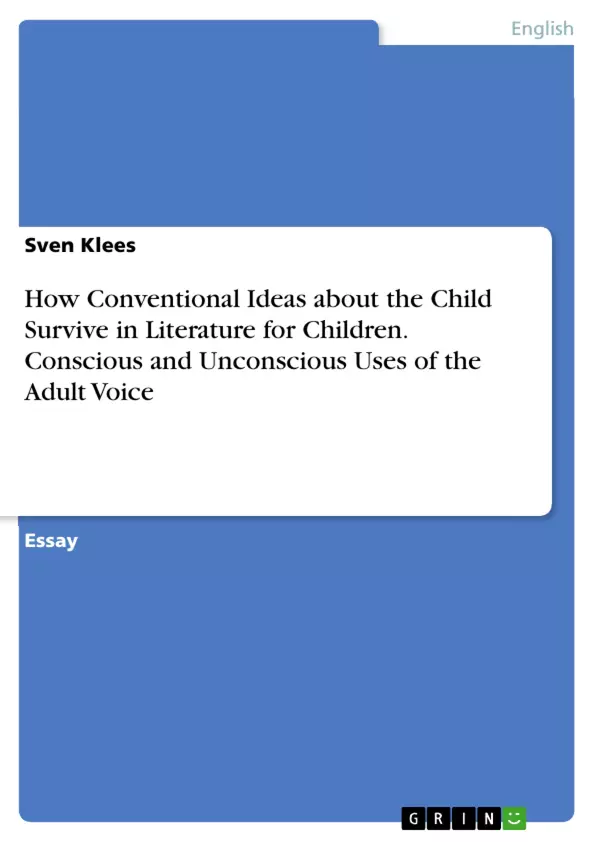In this paper, the 'Hidden Adult' will be considered as a theoretical framework that helps explain how different textual layers in children’s literature come into being and how adults’ views about children are conveyed by its adult authors. Nodelman, author of the "Hidden Adult," argues that although children’s literature usually offers an easy and simplified access to a topic, adult content is still present at all times. Another theory will prove unavoidable to use: the Freudian concept of the ‘unconscious.’
Many ideas about childhood are used in everyday life as well as in literature, certainly often with the author unaware of that fact. They have become so familiar to almost everyone that they will usually be overlooked. In a first step, I will explain Nodelman’s 'Hidden Adult' in more detail and Freud’s well-known concept of the ‘Unconscious’ will be linked to the conception of the 'Hidden Adult.' To give an example where we can find instances of these ideas I will take a closer look at the "UN Convention on the Rights of a Child" in its child-friendly version.
Inhaltsverzeichnis (Table of Contents)
- Introduction
- Nodelman's Hidden Adult and the ‘Unconscious'
- Case Study: The UN Convention on the Rights of a Child (CRC)
- Conclusion
Zielsetzung und Themenschwerpunkte (Objectives and Key Themes)
This paper aims to explore how conventional ideas about childhood are perpetuated in children's literature, examining the conscious and unconscious influences of adult authors. It analyzes Nodelman's concept of the "Hidden Adult" and its connection to the Freudian concept of the "Unconscious." By exploring these concepts, the paper seeks to understand how adult perspectives shape the representation of childhood in children's literature.
- The role of the adult voice in children's literature
- The impact of adult ideas and perspectives on representations of childhood
- The influence of the Freudian "Unconscious" on the construction of childhood in literature
- The use of "shared memories" and cultural representations of childhood in children's literature
- The didactic function of children's literature and its role in shaping children's understanding of childhood
Zusammenfassung der Kapitel (Chapter Summaries)
- Introduction: This chapter introduces the unique characteristics of children's literature, highlighting the prevalence of adult authors and the inherent challenge of concealing adult perspectives. It introduces Nodelman's concept of the Hidden Adult, suggesting that children's literature operates on two levels – one for children and another for adults. The chapter also introduces the Freudian concept of the "Unconscious" as a relevant theoretical framework for understanding the influence of adult perspectives in children's literature.
- Nodelman's Hidden Adult and the 'Unconscious': This chapter delves deeper into Nodelman's argument for the existence of two textual layers in children's literature, addressing both the child and the adult reader. It explores the role of the author's unconscious in shaping the text, suggesting that adult writers unconsciously embed their own experiences and cultural representations of childhood into their narratives. The chapter also considers the potential limitations of the "Unconscious" concept, acknowledging critical voices that question its explanatory power.
Schlüsselwörter (Keywords)
Key terms and focus topics of this paper include children's literature, adult voice, Hidden Adult, Unconscious, Freud, Nodelman, didactic function, cultural representations of childhood, and the representation of childhood in literature.
Frequently Asked Questions
What is the 'Hidden Adult' in children's literature?
Developed by Perry Nodelman, it refers to the adult perspective, values, and knowledge that are always present behind the simplified surface of stories written for children.
How does Freud's concept of the 'Unconscious' relate to children's books?
The paper argues that adult authors often unconsciously embed their own childhood memories and cultural biases into their writing, shaping how childhood is represented.
Why is children's literature considered 'didactic'?
Because it is often used by adults to teach children societal norms, moral values, and specific understandings of what it means to be a 'child'.
What does the UN Convention on the Rights of the Child (CRC) illustrate in this context?
The paper uses the child-friendly version of the CRC to show how adults translate complex legal concepts into simplified language while still maintaining an adult-centric framework.
Is children's literature truly 'for children'?
The research suggests it operates on two levels: providing easy access for children while simultaneously communicating adult ideas and expectations about childhood.
- Citation du texte
- Sven Klees (Auteur), 2017, How Conventional Ideas about the Child Survive in Literature for Children. Conscious and Unconscious Uses of the Adult Voice, Munich, GRIN Verlag, https://www.grin.com/document/954649



